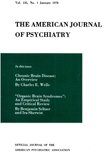ELECTROCONVULSIVE THERAPY IN ELDERLY PATIENTS
Abstract
Mental illness in patients over 65 years is not necessarily "organic" and irreversible. So-called "functional" psychoses in the elderly respond well to electroconvulsive therapy and a high percentage of cases can be restored to the community at the pre-illness level. A group of patients treated with conventional electric shock at the Boston State Hospital from January 1948 to December 1953 is reviewed. In this group of 112 patients from 65 to 83 years of age, with an average age of 71.3 years, 78.5% were able to leave the hospital and 55% of them are out for more than a year. Relapses occurred in 37.5% of recovered cases but most of them again responded readily to treatment.
One patient died as an immediate result of treatment. In 3 patients who suffered from severe physical illness electric shock may have contributed to their deaths. In these patients their life expectancy was very poor even before treatment and their severe physical illness rather than their age was responsible for the unfortunate outcome. In aged people in a reasonable state of health the risk involved appears to be minimal.
The occurrence of only 4 fractures in 1,329 EST's appears to indicate that diminished muscle bulk compensates for the seemingly increased risk of osteoporosis and makes the use of curare-like drugs unnecessary.
Access content
To read the fulltext, please use one of the options below to sign in or purchase access.- Personal login
- Institutional Login
- Sign in via OpenAthens
- Register for access
-
Please login/register if you wish to pair your device and check access availability.
Not a subscriber?
PsychiatryOnline subscription options offer access to the DSM-5 library, books, journals, CME, and patient resources. This all-in-one virtual library provides psychiatrists and mental health professionals with key resources for diagnosis, treatment, research, and professional development.
Need more help? PsychiatryOnline Customer Service may be reached by emailing [email protected] or by calling 800-368-5777 (in the U.S.) or 703-907-7322 (outside the U.S.).



